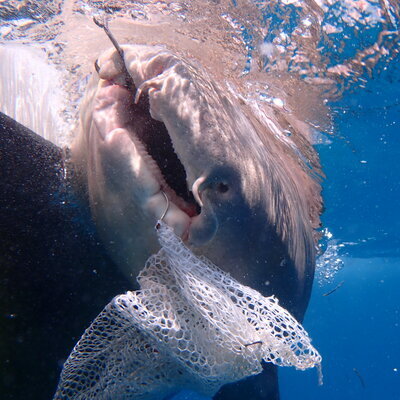Shark Research Expedition #3 with Ocean First Institute
DY Chelsea Rae
Fort Lauderdale, Florida
April 16, 2025
Project Overview
On April 16th, 2025, SeaKeepers and shark scientists from Ocean First Institute (OFI) boarded a local Fort Lauderdale DISCOVERY Vessel, Chelsea Rae, for a day of shark tagging. We returned to the same location as the last two expeditions, offshore Dania Beach. This continued sampling in Fort Lauderdale expands the range of OFI's Florida Keys Shark Research up to Fort Lauderdale. Their research aims to assess the distribution and abundance of sharks, skates and rays in Fort Lauderdale and the Florida Keys using Baited Remote Underwater Video Systems (BRUVS), environmental DNA (eDNA), and metrics of individuals such as length and girth measurements and blood and tissue samples. In addition to tagging, these data provide an important baseline for understanding the health of sharks in Florida waters. All research is conducted under state and federal permits.
Application
This research provides vital insights into the overall health and stability of Florida’s coastal ecosystems. By tracking individual sharks over time and integrating their findings with observational and molecular tools, scientists can detect emerging threats, monitor environmental changes, and evaluate the effectiveness of current protections. The data also plays a crucial role in educating the public and policymakers about the importance of sharks in maintaining balanced marine food webs, ultimately guiding more informed and impactful conservation decisions.
Expedition Summary
On this third outing with Ocean First Institute, SeaKeepers leaned on our connection with DISCOVERY Yacht Chelsea Rae to serve as a platform for the day. Captain Nate and his first mate, Nick, expertly maneuvered us to the same reefs we visited in December 2024 and February 2025. After setting the five BRUVS in a line, we chatted about why sharks are vital to ecosystems, why catching and tagging them this way is vital for their conservation, and why we shouldn't be afraid of them. After an hour, we retrieved the BRUVS and found we had a beautiful nurse shark on the end of the line. This male was tagged with an OFI tag, and Ethan quickly grabbed the logbook to confirm that this was the same male we caught and tagged in February! The team noticed that this shark had a chum bag hooked in his mouth, and when Dr. Chris and Dr. Mikki took his measurements, along with blood and tissue samples, they marked that he had lost a significant amount, around 80cm, in girth. The male was caught in almost the exact same location as last time, and the OFI team suspects that his decrease in mass was due to the inability to eat with a hook and mesh bag in his mouth. After removing the bag, the shark was released back into the ocean, hopefully to feed and recover. Repeat catches and sampling like this not only provide invaluable data on toxin exposure, muscle health, and signs of disease in the past two months, but in this case, may very well have saved a life.
Location
Fort Lauderdale, Florida
Duration of Project
April 16, 2025
Leadership
Research Team
- Dr. Chris Malinowski
- Dr. Mikki McComb-Kobza
- Ethan Dewald
- Dr. Bec Crawford



You must be logged in to post a comment.